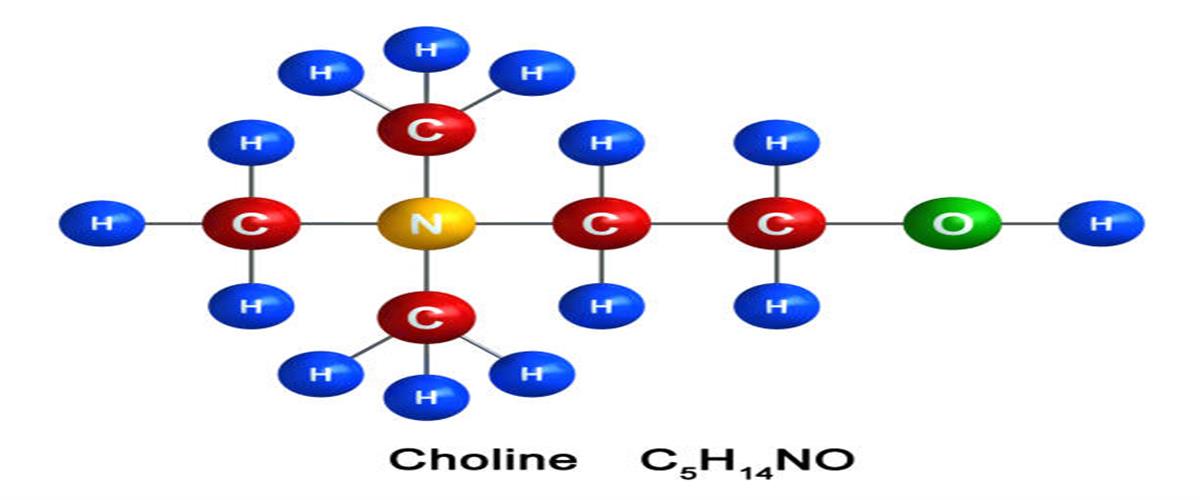In today's fast-paced world, maintaining mental health and cognitive acuity is more important than ever. Alpha GPC offers a promising solution for cognitive enhancement. By supplying adequate choline to the brain, it unlocks the power of choline, giving individuals a competitive advantage in memory, concentration, and overall mental performance.
Nutrition plays an important role in maintaining overall health. We often hear about the importance of macronutrients like carbohydrates, protein, and fat, but what about micronutrients? Choline is a micronutrient that is receiving increasing attention. But what exactly is choline? Why is it so important to your health?
Choline is an essential nutrient and belongs to the B vitamin family. It is essential for many functions in the body, including brain development, nervous system function, supporting energy levels and liver health. Although our bodies can synthesize small amounts of choline, it is still necessary to obtain choline from the diet to meet our daily needs.
Choline contributes to the production of acetylcholine, a neurotransmitter involved in memory and cognitive function. Research shows that choline supplementation during pregnancy and early infancy can have long-term benefits on children's brain development and cognitive function. It is also thought to play a role in preventing age-related cognitive decline and diseases such as Alzheimer's disease.
Choline is also vital for liver health. It helps with fat metabolism, prevents fat accumulation in the liver, and reduces the risk of liver diseases such as non-alcoholic fatty liver disease. Choline deficiency can lead to liver damage and impaired liver function.
Additionally, choline plays a role in other body functions, such as supporting cell structure, nerve function, and muscle movement. It is also involved in DNA synthesis and cell signaling.
Now that we know the importance of choline, let’s explore the dietary sources of this essential nutrient. Choline is found in a variety of foods, including eggs, meat, fish, poultry, dairy products, and certain vegetables like broccoli and Brussels sprouts.
1. Cell structure and integrity
Choline is the basic component in the synthesis of phosphatidylcholine, a key component of cell membranes. This phospholipid ensures the structural integrity of the cell membrane, thereby supporting its normal function. It also allows for proper signaling between cells, which plays a crucial role in various physiological processes. Choline is involved in maintaining cell structure, highlighting its importance to overall cell health and function. Additionally, choline acts as a methyl donor in various biochemical processes. It is involved in DNA synthesis and gene expression, contributing to overall cell growth and development.
2. Liver health and detoxification
Another important role of choline is its involvement in liver health. Choline is necessary for normal fat metabolism, helps clear fat from the liver, and prevents the accumulation of cholesterol and triglycerides. Additionally, choline helps metabolize homocysteine, an amino acid linked to heart disease and stroke. It also helps emulsify dietary fats, making them easier to digest. Choline is involved in fat metabolism and liver health, suggesting its importance in preventing diseases such as fatty liver disease.
3. Brain development and function
Choline plays a vital role in the brain's cognitive functions, promoting memory, learning, and overall brain development. During fetal development, it aids in the formation of the neural tube and ensures normal growth of the brain and spinal cord. Additionally, choline is a precursor to acetylcholine, a neurotransmitter responsible for transmitting signals between nerve cells. Ensuring adequate choline intake at all stages of life is critical to maintaining optimal brain health.
4. Helps improve muscle function
Choline also plays a role in muscle movement and coordination. It is necessary for the production of acetylcholine, a neurotransmitter that carries signals between nerves and muscles. Adequate choline levels ensure proper muscle function and aid in movement, balance and coordination. Athletes and individuals involved in strenuous physical activity may benefit from ensuring they consume adequate choline to optimize their muscle performance.
5. Helps cardiovascular health
Choline is also involved in maintaining a healthy cardiovascular system. It promotes the synthesis of phospholipids, which are an important component of cell membranes and play a vital role in maintaining the integrity of cell membranes. By helping to build and repair cells, choline supports a healthy heart and blood vessels, reducing the risk of cardiovascular disease.
Neurotransmitters play a vital role in communication between brain cells, allowing the nervous system to function properly. One essential nutrient closely related to neurotransmitter function is choline. Choline is an essential nutrient classified as a vitamin-like substance that is essential for the synthesis of acetylcholine, one of the most important neurotransmitters in the body. Choline helps nerve conduction and maintains brain cell membranes.
6. Support the central nervous system
The benefit of choline is that the body can use it in a variety of ways, which is critical for nerve function, including aiding in nerve signaling and maintaining brain cell membranes.
Choline also helps form tissue within the nervous system and is a precursor to acetylcholine, which plays a key role in a variety of cognitive functions, including memory formation, learning and muscle control. Without adequate choline levels, acetylcholine production is affected, resulting in disruption of these important brain activities. Research shows that choline deficiency can adversely affect brain function.
Studies in animals have found that choline deficiency during pregnancy can lead to cognitive impairment in offspring. In addition, insufficient choline levels in adults are associated with increased risk of cognitive decline and neurodegenerative diseases such as Alzheimer's disease.
In addition to its role in acetylcholine synthesis, choline also plays a crucial role in the function of other neurotransmitters such as serotonin and dopamine. These neurotransmitters are involved in mood regulation, reward, and motivation. Choline deficiency has been linked to imbalances in these neurotransmitter systems, leading to mood disorders such as depression and anxiety.
Alpha GPC, also known as L-Alpha Glycerophosphocholine, is a naturally occurring compound in the body that is commonly used as a dietary supplement. It is derived from soy lecithin and is thought to have a variety of cognitive-enhancing benefits.
Alpha GPC plays a vital role in the production of acetylcholine, a neurotransmitter critical for normal brain function. Acetylcholine helps transmit signals between nerve cells and is involved in various cognitive processes such as memory, attention, and learning. When acetylcholine is deficient, it can lead to cognitive decline and various neurological disorders.
Supplementing with Alpha GPC is believed to increase acetylcholine levels in the brain, thereby improving cognitive function. Multiple studies have shown that Alpha GPC can enhance memory and attention in both young and old adults. It has also been found to have potential benefits in treating Alzheimer's disease and other forms of dementia.
In addition to its cognitive benefits, Alpha GPC also has neuroprotective properties. It is thought to improve the health and integrity of brain cells, protect against oxidative damage, and promote the growth of new neurons. These properties make it a promising compound for preventing age-related cognitive decline and neurological diseases.
Additionally, Alpha GPC has been found to have a positive impact on physical performance and athletic ability. It is thought to enhance the production of growth hormone, which plays a vital role in muscle growth, repair and recovery. Athletes and bodybuilders often use Alpha GPC as a performance enhancer to increase power output and build muscle strength.
Alpha GPC is generally considered safe and well tolerated when used as a dietary supplement. However, some people may experience mild side effects, such as headache, dizziness, or gastrointestinal upset. It is important to consult a healthcare professional before starting any new supplement regimen, especially if you have any underlying health conditions or are taking medications.
Alpha GPC, also known as L-Alpha Glycerophosphocholine, is a naturally occurring compound in the body that is commonly used as a dietary supplement. It is derived from soy lecithin and is thought to have a variety of cognitive-enhancing benefits.
Alpha GPC plays a vital role in the production of acetylcholine, a neurotransmitter critical for normal brain function. Acetylcholine helps transmit signals between nerve cells and is involved in various cognitive processes such as memory, attention, and learning. When acetylcholine is deficient, it can lead to cognitive decline and various neurological disorders.
Supplementing with Alpha GPC is believed to increase acetylcholine levels in the brain, thereby improving cognitive function. Multiple studies have shown that Alpha GPC can enhance memory and attention in both young and old adults. It has also been found to have potential benefits in treating Alzheimer's disease and other forms of dementia.
In addition to its cognitive benefits, Alpha GPC also has neuroprotective properties. It is thought to improve the health and integrity of brain cells, protect against oxidative damage, and promote the growth of new neurons. These properties make it a promising compound for preventing age-related cognitive decline and neurological diseases.
Additionally, Alpha GPC has been found to have a positive impact on physical performance and athletic ability. It is thought to enhance the production of growth hormone, which plays a vital role in muscle growth, repair and recovery. Athletes and bodybuilders often use Alpha GPC as a performance enhancer to increase power output and build muscle strength.
Alpha GPC is generally considered safe and well tolerated when used as a dietary supplement. However, some people may experience mild side effects, such as headache, dizziness, or gastrointestinal upset. It is important to consult a healthcare professional before starting any new supplement regimen, especially if you have any underlying health conditions or are taking medications.
Q: What choline supplements should I look for in a good pre-workout drink?
A: When looking for a pre-workout drink, it’s best to choose one that contains a choline supplement. Choline bitartrate and Alpha GPC (alpha-glycerophosphocholine) are commonly used in these drinks.
Q: Is choline therapy beneficial for cognitive impairment?
A: Choline therapy, including the use of choline supplements, is being studied as a potential treatment for cognitive disorders such as Alzheimer's disease due to its role in memory and cognitive function
Disclaimer: This article is for general information only and should not be construed as any medical advice. Some of the blog post information comes from the Internet and is not professional. This website is only responsible for sorting, formatting and editing articles. The purpose of conveying more information does not mean that you agree with its views or confirm the authenticity of its content. Always consult a health care professional before using any supplements or making changes to your health care regimen.
Post time: Nov-08-2023








